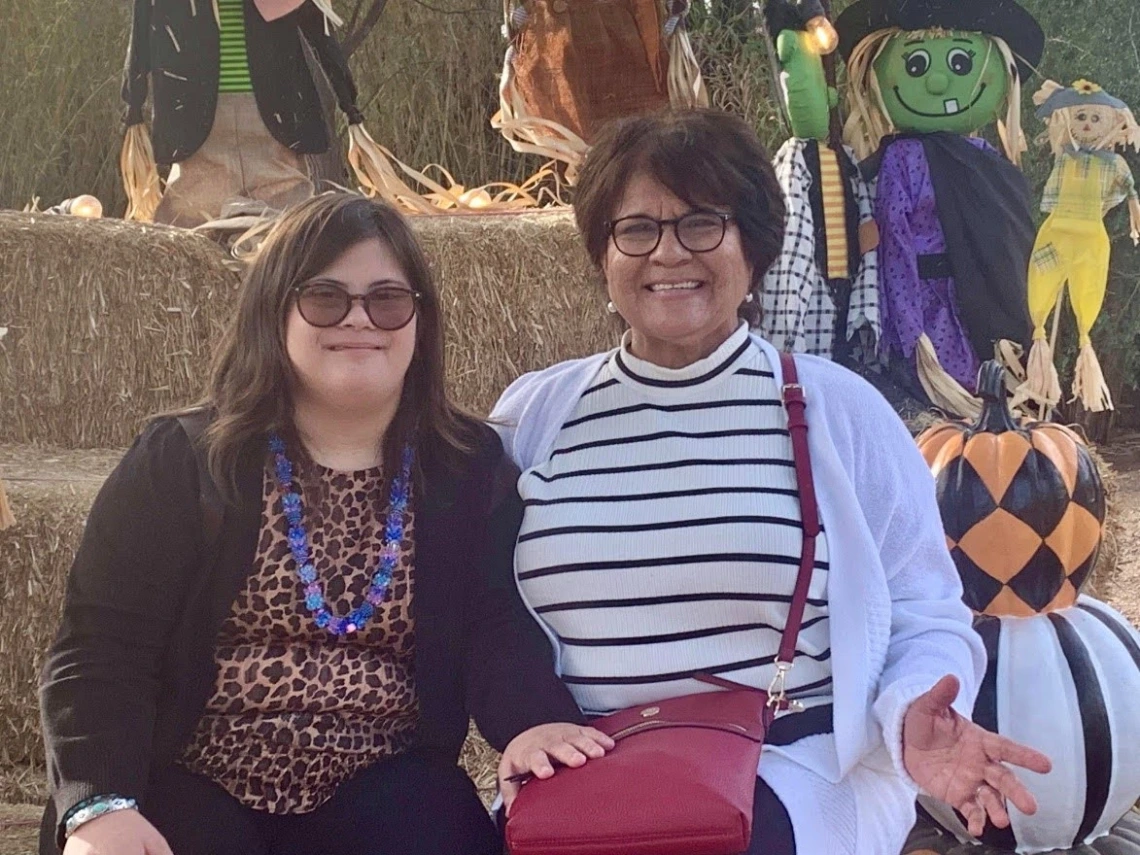Parenting with a Disability: Francine's Story

Francine (left) and her mother, Maria (right), sitting outside on a hay bale surrounded by Halloween decorations
Meet Francine.
Francine is a 23-year-old woman who likes taekwondo and going to the gym. She has a great sense of humor and loves to make people smile. Like many people her age, she is considering the possibility of having children in the future. Francine also has Down Syndrome. The Sonoran Center’s Celina Urquidez and Jocelyn Watson sat down with Francine and her mother, Maria, to talk about how Francine is approaching one of life’s biggest decisions. They discussed her thought process, the resources available to her, and who she can reach out to for support.
On Becoming a Parent
Francine and Celina got right to the point. Francine told Celina that she would love to be a parent one day. “I just love to be with children,” Francine said. While her disability does affect her day-to-day life, it doesn’t change how she feels about being a parent one day.
On Family & Friends
Whatever trail Francine blazes for her future, her mother, Maria, will support her every step of the way. Francine said she talks with her mom about meeting someone someday, and what that process looks like. She also said that Maria is someone she can turn to if she has questions about pregnancy, sex, birth control, or starting a family, because they have a strong relationship. “They say parents should not be a friend of their children,” Maria said, “but I think we’re friends.” Francine’s father and brothers are also supportive. Francine said if any of her friends came to her to talk about starting their own families, Francine would be there to support them. Social isolation can sometimes make it difficult for people with disabilities to get the information they need to make an informed decision about parenthood, but luckily Francine has a strong network.
On Talking with Doctors
When it comes to discussing her future with her doctors and other professionals, Francine has had mixed experiences. Maria mentioned that when Francine was in school, Francine’s doctors brushed off their questions about birth control. Even today, healthcare providers can sometimes be reluctant to talk openly about the subject beyond asking if Francine could be pregnant. Maria and Francine say they sometimes need to press the issue to start the conversation. However, Francine and Maria have also encountered some very supportive healthcare providers along the way as well. So, while there is some progress being made in reducing the stigma around sexual health and family planning for people with developmental disabilities, there is still a lot of work to be done.
On Being a Good Parent
Of course, one’s parenting journey is only just beginning after pregnancy and birth. Looking ahead, Francine told Celina about how she would raise her children, and the supports that would help her. “Being a parent is a big responsibility,” she said. As a parent you need to feed, guide, and love your kids. It’s hard to do it alone, and everyone needs support in one way or another. A supportive partner is high on the list. When asked what her first step in starting a family would be, Francine responded “Getting married one day.” She stressed that she wants to have a good relationship with her future husband before deciding to have children. She said she could also turn to her parents, brothers, and community for support as well. Francine said she would like to learn more about tasks like changing diapers and feeding. Maria agreed that there should be more accessible resources about these everyday parts of parenting.
On Resources & Supports
Both Francine and Maria emphasized that there should be more resources available to parents or prospective parents with disabilities, as well as their families. Maria mentioned receiving handouts at doctors’ offices, which were helpful. Even more helpful, she said, would be “…meetings, workshops, support groups - things that are in-person.” These experiences would help her and Francine connect with people like them and expand their networks of support. They are also accessible to those who can’t or don’t use online resources like Zoom. “We need to connect with the community of parents that want to connect and reach out, so we need help,” Maria said.
In Conclusion
Everyone has the right to decide how they want to build their own family and their own future. Unfortunately, not everyone has the support network, information, and resources to make the choice that’s best for them. Francine is a wonderful example of self-advocacy. By speaking openly about her dreams of parenting and the support she needs, Francine is helping bring awareness to the challenges that many people with intellectual and developmental disabilities face when thinking of becoming parents. By doing so, she is helping many people with disabilities get that much closer to their dream of parenthood.
